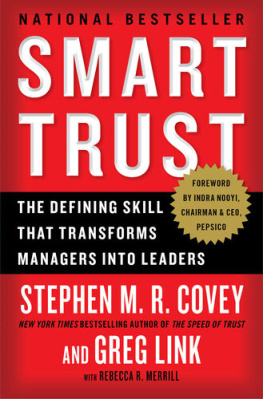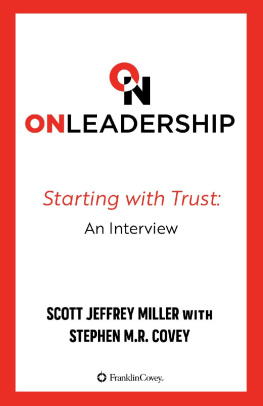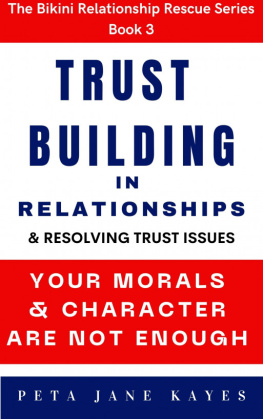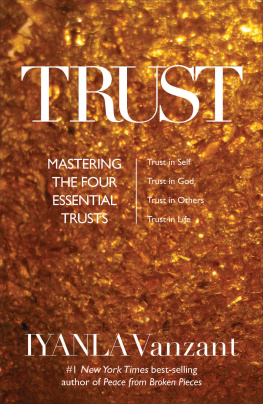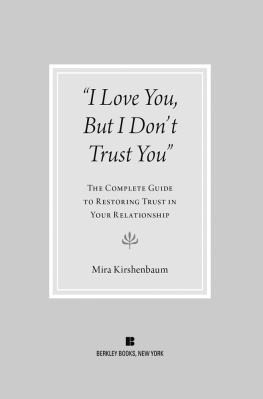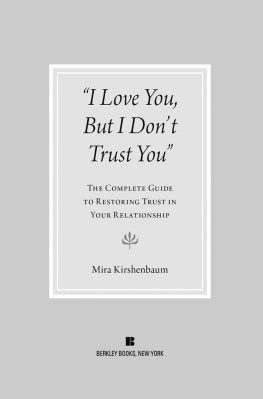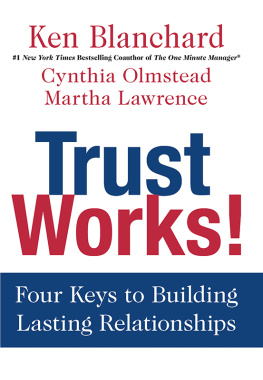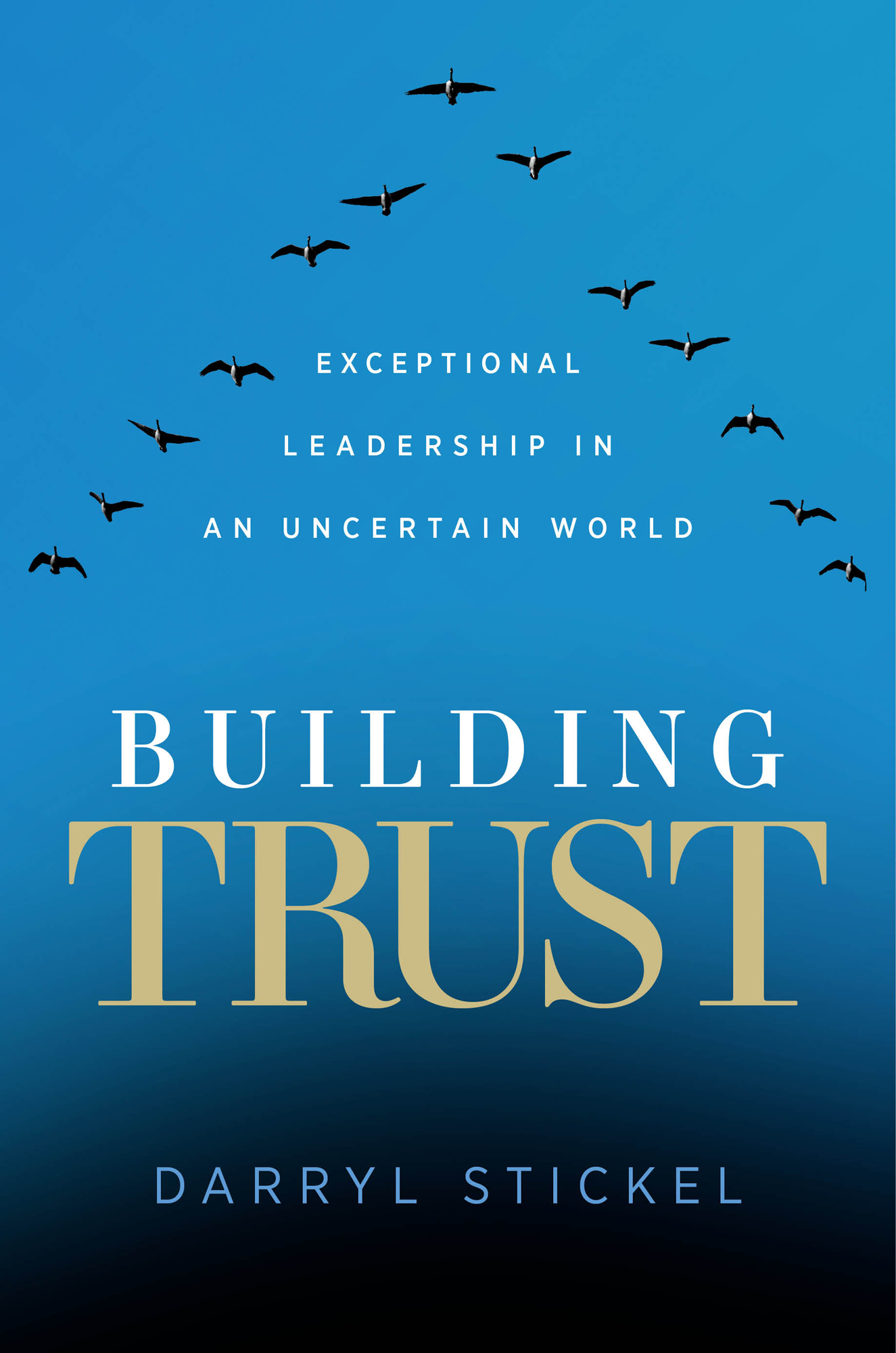Contents
Guide
Exceptional Leadership in an Uncertain World
Building Trust
Darryl Stickel
Praise for Building Trust
I was stunned by the simple practical power of Stickels ideas. He cuts through the confusing morass of leadership challenges in todays world to clarify how trust may be the master skill for dynamic leaders at every level. In the fluid, disrupted world in which we now operate, this book illuminates how a new generation of leaders must cultivate benevolence and integrity to generate the trust on which high-performing organizations now depend. I hope that all of us engaged in working with and learning from a diverse workforce read this book and apply its wisdom in our day-to-day practices.
JOHN SEELY BROWN, former Chief Scientist, Xerox Corporation and Director of Xeroxs Palo Alto Research Center
I knew from my first conversation with Darryl that he and his work are extraordinary. Over the last several years, Ive had the opportunity to partner with, learn from, and laugh with Darryl, and the concepts he outlines in Building Trust have influenced how I lead. Its incredibly powerful to witness what happens when individuals and teams have a common language and understanding of what builds trust, and I have experienced this firsthand with my global team. Trust creates an environment where people can thrive. Building Trust can help. With generosity and a fine balance of deep intellect and empathy, Darryl Stickel takes us on a journey filled with thought provoking questions and real-life examples. My unsolicited advice is: read Building Trust, share it with a friend, and then find a way to have a connection or conversation with Darryl Stickel. His work will make our world a better place.
KELSY TRIGG, Global Head, HR Advisors, SAP
Chock-full of stories, insights, and very helpful techniques, Building Trust by Darryl Stickel is precisely the type of field guide you need to become a leader who builds and demonstrates trust in all your interactions and relationships. Trust me on this one! Its a book that will help.
DAN PONTEFRACT, Leadership Strategist and Best-selling Author of Lead. Care. Win. and Open to Think
The world today seems defined by division and anger as we grapple with real crisis. Sometimes it feels hopeless. Darryl Stickel shows us that rebuilding trust is not only the way forward but that it is both practical and possible.
NAHEED NENSHI, former Mayor of Calgary
Darryl Stickel has spent decades working with highly capable clients to build trust into their portfolios of critical organizational and interpersonal skills. In this book, he reveals how he thinks about trust, how he helps leaders effectively foster trust, and how he helps organizations and their employees learn not only to build trusting relationships, butequally importantto actually merit being trusted by becoming more trustworthy. As you would want from a promoter of trust, Stickel shares his secretshe explains his underlying model, provides practical advice on how to implement it, and makes clear how he came to these insights and has used them successfully in the past. For those who are confronting an uncertain and challenging world of changein other words, all of usthis book provides an accessible guide for trust-focused action.
SIM B. SITKIN, Michael W. Krzyzewski University Professor of Leadership, Professor of Management and Public Policy, and Faculty Director of the Center on Leadership and Ethics, Duke University and President, Delta Leadership, Inc.
As a social capital scholar, Ive known about the importance of trust since Fukuyamas groundbreaking work in the nineties but have never seen something remotely practical about what to do about our tragic loss of trust in todays society. Stickel navigates the literature, clarifies the challenge, and walks leaders and professionals through practical how-to steps. Probably the single-most important book a high-level or aspiring executive could read for the next several years.
DAVID OBSTFELD, Professor of Management Cal State Fullerton and Founder of the Social Capital Academy
Dedication
T O MY SONS T HOMAS AND Alex, who instill in me the desire to be a better person. You give me hope and make me want to contribute to making the world a better place. You are why I strive every day to overcome my ongoing health challenges. You are my reasons for being.
To Drake, my guide dog and best friend. Drake opens doors to a previously inaccessible, shadowy, and lonely world. He not only helps people recognize I am visually impaired but, through his warm and welcoming nature, invites them to interact with us.
Introduction
W E LIVE IN TURBULENT TIMES . This statement almost feels as if it needs a caveat since I dont know who will be reading this or when, but Im comfortable leaving it out there to stand alone, uncontested. Why am I so confident? I started writing this book in 2020, and as I carry out the final edits a year later, I still firmly believe that for the foreseeable future we will continue to live in tempestuous and often perplexing times.
It is during periods such as these that our awareness of the importance of trust becomes heightened and our need for trust increases; however, we simultaneously witness a decrease in the amount of trust in the world. Leaders in the political sphere, the private sector, and academia have come forward to make the case that society is facing significant trust issues. Measures of trust such as the Edelman Trust Barometer suggest that trust levels are at some of their lowest levels ever. Yet rather than seeing suggestions on how we might build or rebuild trust, we are witnessing an alarming pattern of public and private behaviors that are exacerbating the problem.
Its not surprising that leaders are seeing lack of trust as a fundamental problem because their success as leaders depends on their ability to build trust. In reality, people who hold senior positions have less direct control over outcomes and greater dependency on those they lead. Their goals, dreams, and success all depend on the energy and determination of otherseffort that is often contingent on the level of trust those people have in their leaders. Therefore, the ability to build trust becomes one of the primary differentiators between leaders who are merely good and those who are exceptional. This is especially true in todays world in which we are experiencing a rapid pace of technological, social, and societal change (as I will discuss later in this book).
Given the growing consensus that trust is incredibly valuable, why dont we have more of it? The answer is, at least in part, a profound lack of awareness. We often fail to properly identify trust (or the lack thereof) as the underlying cause of problems, and this leads to a host of symptoms that may not be obviously connected to trust. Even when we properly identify trust problems, we usually dont know what to do about solving them.
There are some fundamental challenges when it comes to trustworthiness. Its not a stretch to say that most of us would classify ourselves as trustworthy, and because of this we assume that other people trust uswhy wouldnt they? The trouble with this assumption is simply that it is not always the case; maybe we are not as trustworthy as we think, or perhaps we are not communicating our trustworthiness effectively to others. This is compounded by the difficulty we face in knowing whether people trust us at allhow do we tell? And it doesnt stop there because it goes both ways: we are constantly wishing we could place greater trust in the people with whom we interact. Unfortunately, most of us see issues surrounding trust as someone elses concern, not our own. At this point you may be wishing your boss/partner/coworker were more benevolent, more competent, and acted with greater integrity (or perhaps that they would just read this book). However, we need to accept the role we play, and a level of responsibility, in any trust problems we facebe they global, corporate, or within our circle of family and friends. Sadly, our default position is often that its somebody elses problem to fix.


